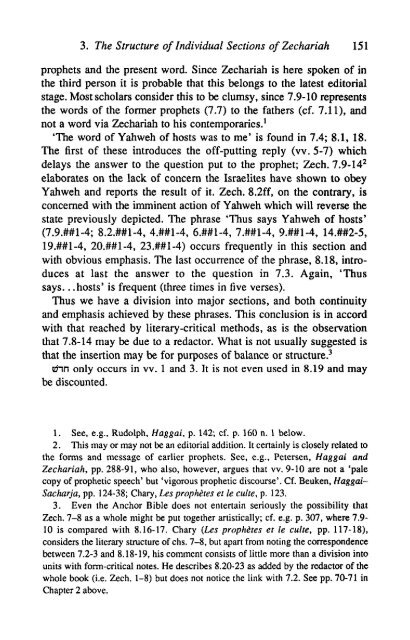130. - Collection Point® | The Total Digital Asset Management System
130. - Collection Point® | The Total Digital Asset Management System
130. - Collection Point® | The Total Digital Asset Management System
You also want an ePaper? Increase the reach of your titles
YUMPU automatically turns print PDFs into web optimized ePapers that Google loves.
3. <strong>The</strong> Structure of Individual Sections of Zechariah 151<br />
prophets and the present word. Since Zechariah is here spoken of in<br />
the third person it is probable that this belongs to the latest editorial<br />
stage. Most scholars consider this to be clumsy, since 7.9-10 represents<br />
the words of the former prophets (7.7) to the fathers (cf. 7.11), and<br />
not a word via Zechariah to his contemporaries. 1<br />
'<strong>The</strong> word of Yahweh of hosts was to me' is found in 7.4; 8.1, 18.<br />
<strong>The</strong> first of these introduces the off-putting reply (vv. 5-7) which<br />
delays the answer to the question put to the prophet; Zech. 7.9-14 2<br />
elaborates on the lack of concern the Israelites have shown to obey<br />
Yahweh and reports the result of it. Zech. 8.2ff, on the contrary, is<br />
concerned with the imminent action of Yahweh which will reverse the<br />
state previously depicted. <strong>The</strong> phrase 'Thus says Yahweh of hosts'<br />
(7.9J#l-4; 8.2J#l-4, 4.##l-4, 6.##l-4, 7 .##1-4, 9.##l-4, 14.##2-5,<br />
19.##l-4, 20.##l-4, 23.##l-4) occurs frequently in this section and<br />
with obvious emphasis. <strong>The</strong> last occurrence of the phrase, 8.18, introduces<br />
at last the answer to the question in 7.3. Again, 'Thus<br />
says.. .hosts' is frequent (three times in five verses).<br />
Thus we have a division into major sections, and both continuity<br />
and emphasis achieved by these phrases. This conclusion is in accord<br />
with that reached by literary-critical methods, as is the observation<br />
that 7.8-14 may be due to a redactor. What is not usually suggested is<br />
that the insertion may be for purposes of balance or structure. 3<br />
tf~in only occurs in vv. 1 and 3. It is not even used in 8.19 and ma<br />
be discounted.<br />
1. See, e.g., Rudolph, Haggai, p. 142; cf. p. 160 n. 1 below.<br />
2. This may or may not be an editorial addition. It certainly is closely related to<br />
the forms and message of earlier prophets. See, e.g., Petersen, Haggai and<br />
Zechariah, pp. 288-91, who also, however, argues that vv. 9-10 are not a 'pale<br />
copy of prophetic speech' but 'vigorous prophetic discourse'. Cf. Beuken, Haggai-<br />
Sacharja, pp. 124-38; Chary, Les prophetes el le culte, p. 123.<br />
3. Even the Anchor Bible does not entertain seriously the possibility that<br />
Zech. 7-8 as a whole might be put together artistically; cf. e.g. p. 307, where 7.9-<br />
10 is compared with 8.16-17. Chary (Les prophetes et le culte, pp. 117-18),<br />
considers the literary structure of chs. 7-8, but apart from noting the correspondence<br />
between 7.2-3 and 8.18-19, his comment consists of little more than a division int<br />
units with form-critical notes. He describes 8.20-23 as added by the redactor of the<br />
whole book (i.e. Zech. 1-8) but does not notice the link with 7.2. See pp. 70-71 i<br />
Chapter 2 above.






